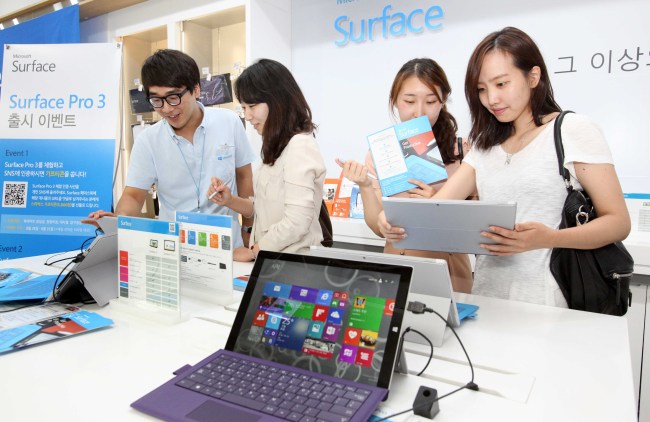3rd time’s a charm for MS Surface?
New hybrid device likely to face low sales, identity crisis, analysts say
By Kim Young-wonPublished : Aug. 29, 2014 - 20:45
Microsoft released the Surface Pro 3, its latest laptop-tablet hybrid that aims to replace traditional laptops, earlier this week in South Korea.
But industry sources said Microsoft’s new convergent device could once again founder amid the continued rising dominance of Samsung and Apple, which account for almost 50 percent of the global tablet PC market.
Microsoft has failed to wow consumers with its previous Surface models and Windows Phone.
But industry sources said Microsoft’s new convergent device could once again founder amid the continued rising dominance of Samsung and Apple, which account for almost 50 percent of the global tablet PC market.
Microsoft has failed to wow consumers with its previous Surface models and Windows Phone.

“The new Microsoft device will likely struggle as consumers have already gotten used to products running on Google’s Android operating system and Apple’s iOS,” a market watcher said on condition of anonymity.
“It also lacks a variety of applications compared to those available for the Samsung-Android and Apple products.”
To make matters worse, Microsoft faces an onslaught of competition with inexpensive devices from China, which also seeks to develop its own operating system to replace not only the Windows developer but also Google and Apple.
Richard Yu, Huawei’s consumer business group chief, said in a recent interview with the Wall Street Journal that it has stopped manufacturing Windows-based products as the sales of the devices have been unsatisfactory.
The Surface Pro 3, equipped with a kickstand on the back, comes with a keyboard and a stylus pen, giving users an option to use the product as a laptop or a slate PC.
Market watchers said the unclear identity of the new Surface would also pose a challenge, noting that the hybrid product would fail to replace both laptops and PCs.
“I think some might opt to choose the Surface Pro 3, which boasts powerful hardware, including a high-resolution display and Intel’s latest processors. But most people would still stick to using their laptops or PCs for office software programs instead of buying the new hybrid product, which is a little expensive,” said Seo Won-seok, an analyst at Korea Investment and Securities.
Another tech failure will likely deal a severe blow to Microsoft, which has not only entered the mobile space much later than its competitors but also has been bleeding cash in the Surface lineup and smartphone business.
Microsoft acquired Nokia’s Devices and Services business, which makes smartphones, for $7 billion in April.
The worldwide shipment volume of Microsoft’s smartphones dropped to 7.4 million units in the second quarter, down from 8.2 million units a year ago, according to the global market researcher IDC.
Its market share fell from 3.4 percent to 2.5 percent in the same period.
By Kim Young-won (wone0102@heraldcorp.com)







![[KH Explains] Hyundai's full hybrid edge to pay off amid slow transition to pure EVs](http://res.heraldm.com/phpwas/restmb_idxmake.php?idx=644&simg=/content/image/2024/04/18/20240418050645_0.jpg&u=20240419100350)






![[From the Scene] Monks, Buddhists hail return of remains of Buddhas](http://res.heraldm.com/phpwas/restmb_idxmake.php?idx=652&simg=/content/image/2024/04/19/20240419050617_0.jpg&u=20240419175937)

![[KH Explains] Hyundai's full hybrid edge to pay off amid slow transition to pure EVs](http://res.heraldm.com/phpwas/restmb_idxmake.php?idx=652&simg=/content/image/2024/04/18/20240418050645_0.jpg&u=20240419100350)

![[Today’s K-pop] Illit drops debut single remix](http://res.heraldm.com/phpwas/restmb_idxmake.php?idx=642&simg=/content/image/2024/04/19/20240419050612_0.jpg&u=)